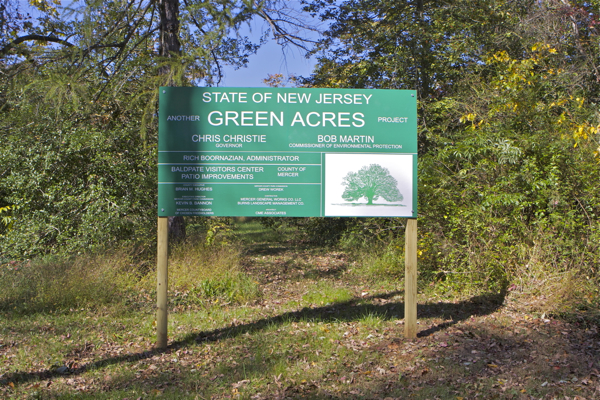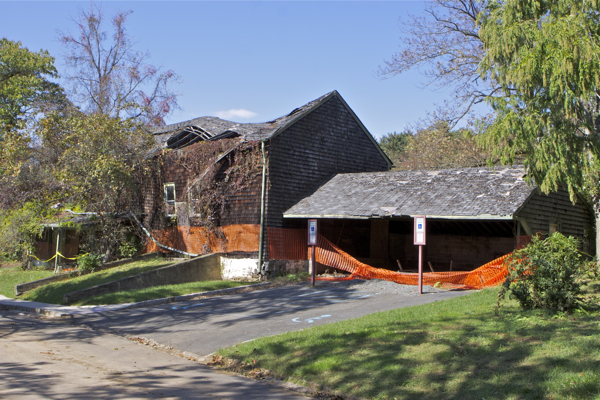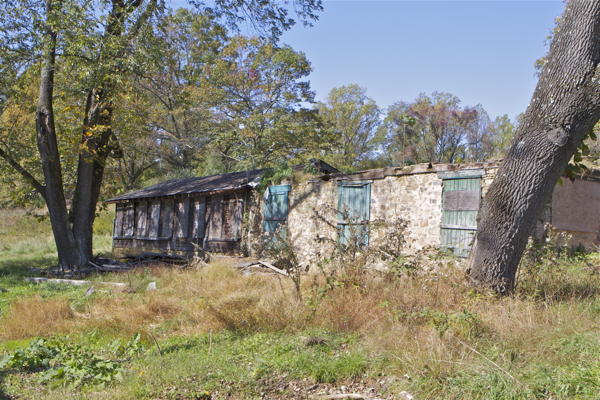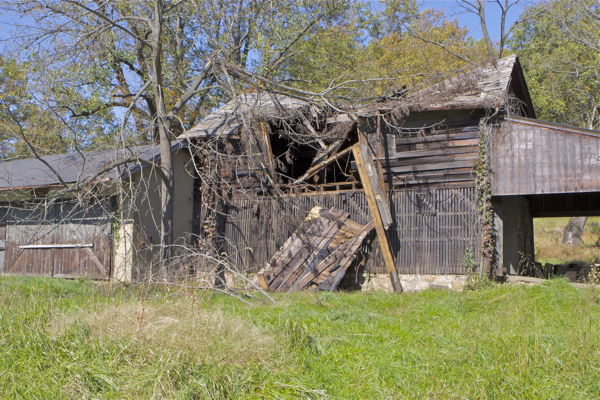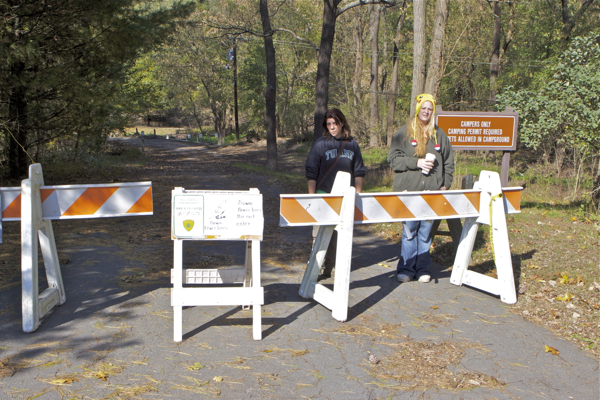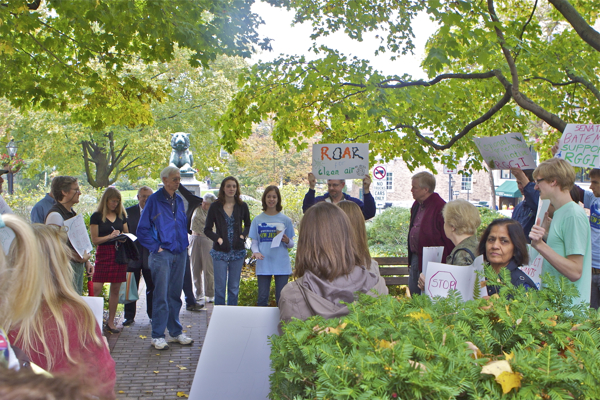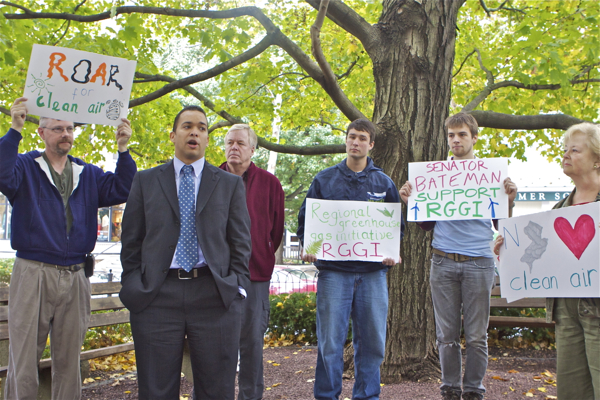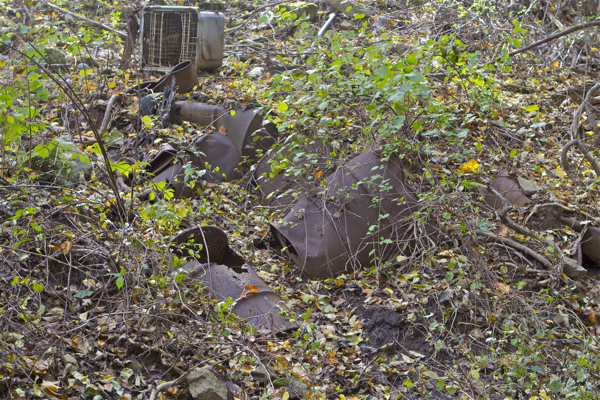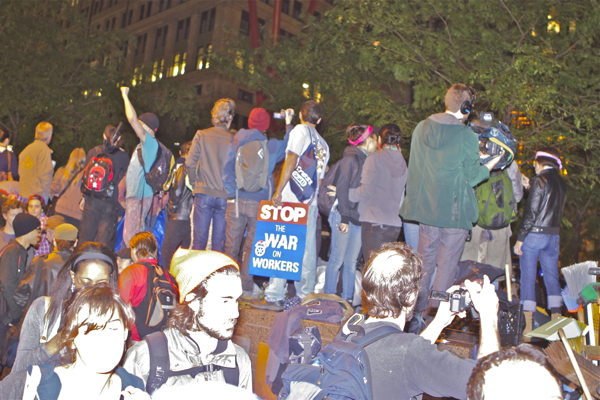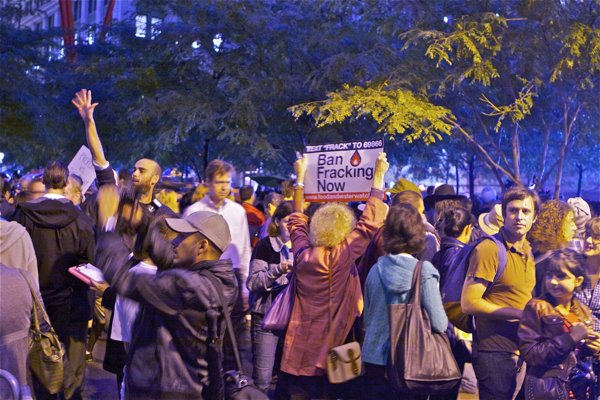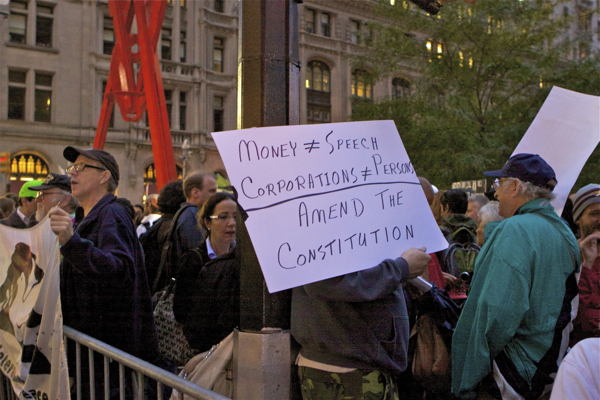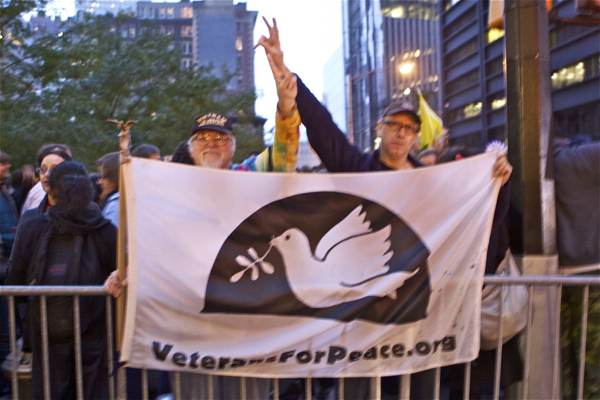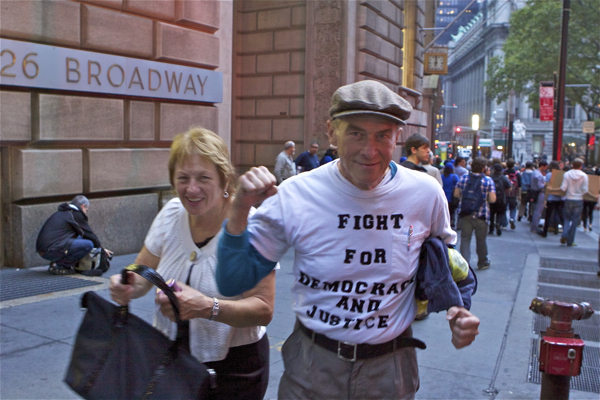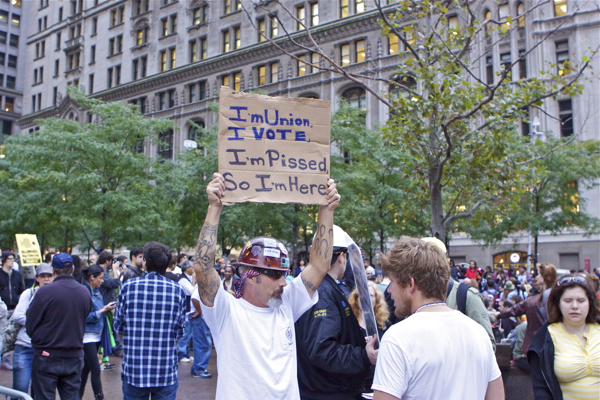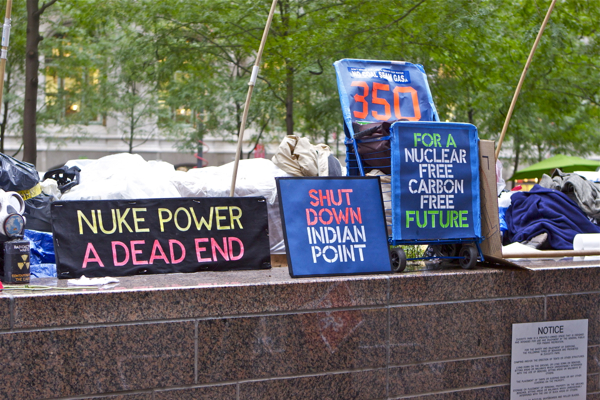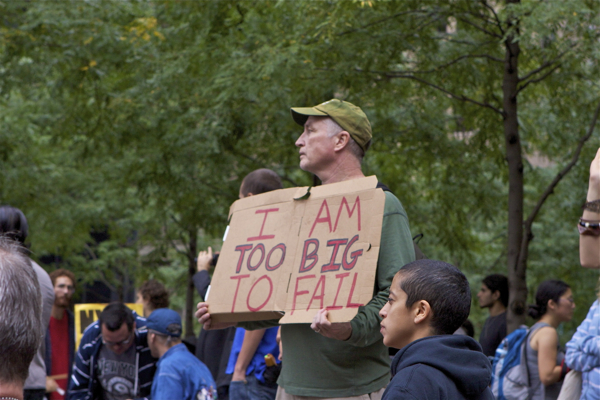
Liberty Plaza (early morning, 10/14/11)
I made my second visit to Occupy Wall Street early Friday morning. (took the 3:53 am train out of Hamilton, NJ)
I responded to an emergency call to action put out by the protesters on Thursday.
I went to lend my support – and put my body on the line if necessary – to prevent the planned eviction from Zuccotti Park, under the pretext of “cleaning” the privately owned park.
I brought my bicycle helmet, expecting assaults by police.
The Park was packed wall to wall, and the perimeter was clogged by additional supporters.
I spoke with organizers and was briefed on the plan to allow cleaning in phases, but to lock arms and peacefully resist any attempt to remove protesters or their living shelters (tents, tarps, sleeping bags, etc) from the Park. Anyone willing to be arrested was asked to join and link arms, should that be necessary.
The mood was tense as I considered my options.
While the intention of the protesters was non-violent, it was obvious that any move to evict would be violent.
I could see that folks were serious and would not back down – and that some of the cops seemed eager for a confrontation, mainly the older white fat guys in the visible Command white shirts.
But, about 6:30 am, a huge roar emerged from the Park, as it was announced that the City backed down from the planned eviction.
The protesters and their supporters had backed off the Mayor and the cops – a huge win.
Since then, I’ve read the news coverage of the event, and am baffled by those who seem unable to understand “the message” of the OWS movement. [Watch this Chris Hedges interview on that].
After my first visit, I linked the OWS movement to the true meaning of MLK – economic and social justice – a transformation that would require what King called a “revolution of values” .
Today, Chris Hedges’ essay picked up on and beautifully elaborates on those themes – printed below in full, without permission!
[Update: check out Hedges interview in Times Square on Saturday night. I’ll make just two observations on that: 1) my feelings are very much the same, in terms of seeing this through the lens of my kids and the world they will live in. and 2) Cornel West was embraced by OWS. His reception and his motivations were very different than the political and union visiting celebrities Hedges mentions.]
A Movement Too Big To Fail
By Chris Hedges
There is no danger that the protesters who have occupied squares, parks and plazas across the nation in defiance of the corporate state will be co-opted by the Democratic Party or groups like MoveOn. The faux liberal reformers, whose abject failure to stand up for the rights of the poor and the working class, have signed on to this movement because they fear becoming irrelevant. Union leaders, who pull down salaries five times that of the rank and file as they bargain away rights and benefits, know the foundations are shaking. So do Democratic politicians from Barack Obama to Nancy Pelosi. So do the array of “liberal” groups and institutions, including the press, that have worked to funnel discontented voters back into the swamp of electoral politics and mocked those who called for profound structural reform.
Resistance, real resistance, to the corporate state was displayed when a couple of thousand protesters, clutching mops and brooms, early Friday morning forced the owners of Zuccotti Park and the New York City police to back down from a proposed attempt to expel them in order to “clean” the premises. These protesters in that one glorious moment did what the traditional “liberal” establishment has steadily refused to do: fight back. And it was deeply moving to watch the corporate rats scamper back to their holes on Wall Street. It lent a whole new meaning to the phrase “too big to fail”
Tinkering with the corporate state will not work. We will either be plunged into neo-feudalism and environmental catastrophe or we will wrest power from corporate hands. This radical message, one that demands a reversal of the corporate coup, is one the power elite, including the liberal class, is desperately trying to thwart. But the liberal class has no credibility left. It collaborated with corporate lobbyists to neglect the rights of tens of millions of Americans, as well as the innocents in our imperial wars. The best that liberals can do is sheepishly pretend this is what they wanted all along. Groups such as MoveOn and organized labor will find themselves without a constituency unless they at least pay lip service to the protests. The Teamsters’ arrival Friday morning to help defend the park signaled an infusion of this new radicalism into moribund unions rather than a co-opting of the protest movement by the traditional liberal establishment. The union bosses, in short, had no choice.
The Occupy Wall Street movement, like all radical movements, has obliterated the narrow political parameters. It proposes something new. It will not make concessions with corrupt systems of corporate power. It holds fast to moral imperatives regardless of the cost. It confronts authority out of a sense of responsibility. It is not interested in formal positions of power. It is not seeking office. It is not trying to get people to vote. It has no resources. It can’t carry suitcases of money to congressional offices or run millions of dollars of advertisements. All it can do is ask us to use our bodies and voices, often at personal risk, to fight back. It has no other way of defying the corporate state. This rebellion creates a real community instead of a managed or virtual one. It affirms our dignity. It permits us to become free and independent human beings.
Martin Luther King was repeatedly betrayed by liberal supporters, especially when he began to challenge economic forms of discrimination, which demanded that liberals, rather than simply white Southern racists, begin to make sacrifices. King too was a radical. He would not compromise on nonviolence, racism or justice. He understood that movements” ”such as the Liberty Party, which fought slavery, the suffragists, who fought for women’s rights, the labor movement and the civil rights movement’s have always been the true correctives in American democracy. None of those movements achieved formal political power. But by holding fast to moral imperatives they made the powerful fear them. King knew that racial equality was impossible without economic justice and an end to militarism. And he had no intention of ceding to the demands of the liberal establishment that called on him to be calm and patience.
“For years, I labored with the idea of reforming the existing institutions in the South, a little change here, a little change there,” King said shortly before he was assassinated. “Now I feel quite differently. I think you’ve got to have a reconstruction of the entire system, a revolution of values.”
King was killed in 1968 when he was in Memphis to support a strike by sanitation workers. By then he had begun to say that his dream, the one that the corporate state has frozen into a few safe cliche’s from his 1963 speech in Washington, had turned into a nightmare. King called at the end of his life for massive federal funds to rebuild inner cities, what he called “a radical redistribution of economic and political power” a complete restructuring of the architecture of American society.” He grasped that the inequities of capitalism had become the instrument by which the poor would always remain poor.
“Call it democracy, or call it democratic socialism,” King said, “but there must be a better distribution of wealth within this country for all of God’s children.”
On the eve of King’s murder he was preparing to organize a poor people’s march on Washington, D.C., designed to cause “major, massive dislocations” a nonviolent demand by the poor, including the white underclass, for a system of economic equality. It would be 43 years before his vision was realized by an eclectic group of protesters who gathered before the gates of Wall Street.
The truth of America is understood only when you listen to voices in our impoverished rural enclaves, prisons and the urban slums, when you hear the words of our unemployed, those who have lost their homes or cannot pay their medical bills, our elderly and our children, especially the quarter of the nation’s children who depend on food stamps to eat, and all who are marginalized. There is more reality expressed about the American experience by the debt-burdened young men and women protesting in the parks than by all the chatter of the well-paid pundits and experts that pollutes the airwaves.
What kind of nation is it that spends far more to kill enemy combatants and Afghan and Iraqi civilians than it does to help its own citizens who live below the poverty line? What kind of nation is it that permits corporations to hold sick children hostage while their parents frantically bankrupt themselves to save their sons and daughters? What kind of nation is it that tosses its mentally ill onto urban heating grates? What kind of nation is it that abandons its unemployed while it loots its treasury on behalf of speculators? What kind of nation is it that ignores due process to torture and assassinate its own citizens? What kind of nation is it that refuses to halt the destruction of the ecosystem by the fossil fuel industry, dooming our children and our children’s children?
“America”, Langston Hughes wrote, “never was America to me”
“The black vote mean [nothing], the rapper Nas intones. “Who you gunna elect/ Satan or Satan?/ In the hood nothing is changing/ We ain’t got no choices.”
Or listen to hip-hop artist Talib Kweli: “Back in the ’60s, there was a big push for black politicians, and now we have more than we ever had before, but our communities are so much worse. A lot of people died for us to vote, I’m aware of that history, but these politicians are not in touch with people at all. Politics is not the truth to me, it’s an illusion.”
The liberal class functions in a traditional, capitalist democracy as a safety valve. It lets off enough steam to keep the system intact. It makes piecemeal and incremental reform possible. This is what happened during the Great Depression and the New Deal. Franklin Delano Roosevelt’s greatest achievement was that he saved capitalism. Liberals in a functioning capitalist democracy are at the same time tasked with discrediting radicals, whether it is King, especially after he denounced the war in Vietnam, or later Noam Chomsky or Ralph Nader.
The stupidity of the corporate state is that it thought it could dispense with the liberal class. It thought it could shut off that safety valve in order to loot and pillage with no impediments. Corporate power forgot that the liberal class, when it functions, gives legitimacy to the power elite. And the reduction of the liberal class to silly courtiers, who have nothing to offer but empty rhetoric, meant that the growing discontent found other mechanisms and outlets. Liberals were reduced to stick figures, part of an elaborate pantomime, as they acted in preordained roles to give legitimacy to meaningless and useless political theater. But that game is over.
Human history has amply demonstrated that once those in positions of power become redundant and impotent, yet retain the trappings and privileges of power, they are brutally discarded. The liberal class, which insists on clinging to its positions of privilege while at the same time refusing to play its traditional role within the democratic state, has become a useless and despised appendage of corporate power. And as the engines of corporate power pollute and poison the ecosystem and propel us into a world where there will be only masters and serfs, the liberal class, which serves no purpose in the new configuration, is being abandoned and discarded by both the corporate state and radical dissidents. The best it can do is attach itself meekly to the new political configuration rising up to replace it.
An ineffectual liberal class means there is no hope of a correction or a reversal through the formal mechanisms of power. It ensures that the frustration and anger among the working and the middle class will find expression now in these protests that lie outside the confines of democratic institutions and the civilities of a liberal democracy. By emasculating the liberal class, which once ensured that restive citizens could institute moderate reforms, the corporate state has created a closed system defined by polarization, gridlock and political charades. It has removed the veneer of virtue and goodness that the liberal class offered to the power elite.
Liberal institutions, including the church, the press, the university, the Democratic Party, the arts and labor unions, set the parameters for limited self-criticism in a functioning democracy as well as small, incremental reforms. The liberal class is permitted to decry the worst excesses of power and champion basic human rights while at the same time endowing systems of power with a morality and virtue it does not possess. Liberals posit themselves as the conscience of the nation. They permit us, through their appeal to public virtues and the public good, to see ourselves and our state as fundamentally good.
But the liberal class, by having refused to question the utopian promises of unfettered capitalism and globalization and by condemning those who did, severed itself from the roots of creative and bold thought, the only forces that could have prevented the liberal class from merging completely with the power elite. The liberal class, which at once was betrayed and betrayed itself, has no role left to play in the battle between us and corporate dominance. All hope lies now with those in the street.
Liberals lack the vision and fortitude to challenge dominant free market ideologies. They have no ideological alternatives even as the Democratic Party openly betrays every principle the liberal class claims to espouse, from universal health care to an end to our permanent war economy to a demand for quality and affordable public education to a return of civil liberties to a demand for jobs and welfare of the working class. The corporate state forced the liberal class to join in the nation’s death march that began with the presidency of Ronald Reagan. Liberals such as Bill Clinton, for corporate money, accelerated the dismantling of our manufacturing base, the gutting of our regulatory agencies, the destruction of our social service programs and the empowerment of speculators who have trashed our economy. The liberal class, stripped of power, could only retreat into its atrophied institutions, where it busied itself with the boutique activism of political correctness and embraced positions it had previously condemned.
Russell Jacoby writes: “The left once dismissed the market as exploitative; it now honors the market as rational and humane. The left once disdained mass culture as exploitative; now it celebrates it as rebellious. The left once honored independent intellectuals as courageous; now it sneers at them as elitist. The left once rejected pluralism as superficial; now it worships it as profound. We are witnessing not simply a defeat of the left, but its conversion and perhaps inversion.â€
Hope in this age of bankrupt capitalism comes with the return of the language of class conflict and rebellion, language that has been purged from the lexicon of the liberal class, language that defines this new movement. This does not mean we have to agree with Karl Marx, who advocated violence and whose worship of the state as a utopian mechanism led to another form of enslavement of the working class, but we have to learn again to speak in the vocabulary Marx employed. We have to grasp, as Marx and Adam Smith did, that corporations are not concerned with the common good. They exploit, pollute, impoverish, repress, kill and lie to make money. They throw poor families out of homes, let the uninsured die, wage useless wars to make profits, poison and pollute the ecosystem, slash social assistance programs, gut public education, trash the global economy, plunder the U.S. Treasury and crush all popular movements that seek justice for working men and women. They worship money and power. And, as Marx knew, unfettered capitalism is a revolutionary force that consumes greater and greater numbers of human lives until it finally consumes itself. The dead zone in the Gulf of Mexico is the perfect metaphor for the corporate state. It is part of the same nightmare experienced in postindustrial mill towns of New England and the abandoned steel mills of Ohio. It is a nightmare that Iraqis, Pakistanis and Afghans, living in terror and mourning their dead, endure daily.
What took place early Friday morning in Zuccotti Park was the first salvo in a long struggle for justice. It signaled a step backward by the corporate state in the face of popular pressure. And it was carried out by ordinary men and women who sleep at night on concrete, get soaked in rainstorms, eat donated food and have nothing as weapons but their dignity, resilience and courage. It is they, and they alone, who hold out the possibility of salvation. And if we join them we might have a chance.



